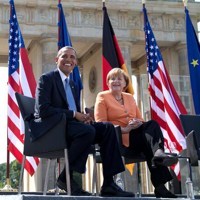German Chancellor Angela Merkel is meeting with U.S. President Barack Obama today amid escalating tensions in Ukraine and lingering mistrust over NSA spying revelations. In an email interview, Sudha David-Wilp, senior trans-Atlantic fellow at the German Marshall Fund of the United States, explained where the two countries’ interests overlap, and where they diverge.
WPR: How closely do the U.S. and Germany’s political and economic interests converge—within Europe, in the trans-Atlantic context and globally—and where do they diverge?
Sudha David-Wilp: Germany and the U.S. refer to the trans-Atlantic partnership as one steeped in common values. Under that broad justification for working together, there are many overlapping traditional and contemporary interests such as: strengthening NATO, ensuring stability in Afghanistan, curbing nuclear proliferation in Iran and promoting free trade across the Atlantic. While policymakers in both countries realize cooperation is necessary to tackle complex challenges in a post-Cold War environment, the means at their disposal to achieve their goals are not necessarily congruent. The U.S. can choose to wield hard and soft power, while Germany prefers the latter, usually by way of flexing its economic muscle. Although German political elites have recently mused about a more robust German foreign and security policy, their voters are content to avoid conflict. A recent Deutschlandtrend survey by German broadcaster ARD found that 49 percent of Germans would prefer to take a middle position between the Western alliance and Russia in the context of the current crisis in Ukraine.

